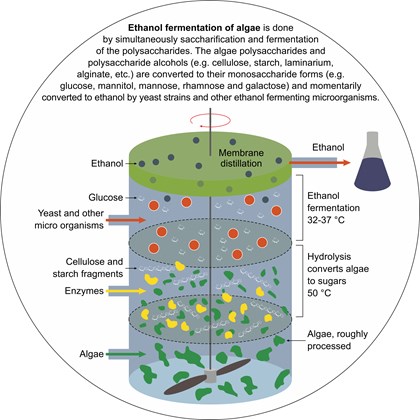Algae, often referred to as seaweed or kelp, is considered a good source of raw material for the production of environmentally friendly energy, animal feed, food and cosmetics. With European research in algae cultivation and utilisation still in its early stages, AlgeCenter Danmark is a pioneer in the field. AlgeCenter Danmark has made some promising findings regarding algae cultivation and utilisation, and is currently at the forefront of European research seeking breakthroughs to increase the viability of algae-based biofuels from an economic perspective.
Macroalgae for sustainable growth
Estimates show that the world is running out of arable farmland for food and energy production. Given that seas and oceans cover over 70% of the Earth’s surface, improved utilisation of seas and oceans as viable farming areas provides a possible solution to this problem. Macroalgae in particular have proven useful in both food and energy production. Danish waters contain over 300 macroalgae species. Worldwide, this number is far higher—over 10,000 species—and many of these species are highly nutritious. AlgeCenter Danmark was founded in 2011 in Grenaa, Denmark, with the main objective of researching the utilisation of algae in energy, food, and medicine production.
Algae research in Grenaa, Denmark
AlgeCenter Danmark is consortium of four partners: the Danish Technological Institute, Aarhus University Department of Bioscience, Ocean Centre Denmark, and Kattegatcentret. Its stated purpose “is to find out how algae can be used as a new resource in a world where traditional resources are under pressure” (AlgeCenter Danmark 2016). Potential examples include sustainable energy, food, medicine and food ingredients. Research into algae cultivation is still in its infancy in Denmark, but this has not slowed the progress of AlgeCenter Danmark. Numerous research projects are being carried out simultaneously at AlgeCenter Danmark, most of which at the Grenaa Harbour plant, which is equipped with 12 algae cultivation tanks.

MacroFuels advance the case for algae-based biofuels
AlgeCenter Danmark is a key partner in the consortium behind MacroFuels, a European project involving six countries that is seeking breakthroughs in the production of advanced biofuels from seaweed and macroalgae. Previous research, including that conducted by AlgeCenter Danmark (2013), has demonstrated that, from a technical perspective, seaweed is suitable for biogas production (see figure: Producing biogas from algae). MacroFuels seeks to build upon this work, making it viable from both a practical and an economic perspective. Currently, the high biomass yield required, coupled with high production costs, means that large-scale production of algae for biofuels is not economically viable. Through technical and process-oriented breakthroughs, it is hoped that these barriers can be overcome and that algae based biofuels can become a genuine alternative to both fossil fuels and land-based biofuel sources that compete for scarce cropland. The project is funded by the European Union’s Horizon 2020 Research and Innovation Programme, and includes 12 partners from across Europe.
Regional dimension
AlgeCenter Danmark’s activities have both short- and long-term consequences for regional development. In the short term, research activities provide local jobs that support the knowledge economy and stimulate cross-sectorial collaboration on the national and international levels. In the long term, the findings of this research have the potential to generate thousands of jobs and stimulate new and innovative business ideas across the entire value chain.
Learn more…